When one’s good fortune and fame are lost, it is a source of immense grief, dejection, and despair even for the best of men trained in higher truths and principles. There was one such man called ‘Boethius’ who sat forlorn and morose in his prison cell, unfairly convicted and a victim of deceit, he was condemned to death. He was an eminent political figure who rose to great political heights; one of the few noble men who was truly noble in his character, deeds, intentions, and values. He was righteous, well-learned in high-minded philosophy, and followed those principles to the letter in all his dealings. As such, being a truly genuine soul with noble conduct amidst the rest of the unscrupulous senate, he stuck out like a sore thumb and was considered detrimental. Therefore, he was eliminated by a deceitful process of false accusations and wrongful allegations. Sitting in his cell, he began questioning his faith and virtues and felt that the very principles he upheld had let him down. Thus, he got covered in a dense fog of demoralizing ignorance and lost sight of the highest scruples that ‘Philosophy’ had once taught him.
At this time, when he felt utterly lost, misunderstood, and mistreated, Lady Philosophy paid her disciple a visit. She reminded him of all that she had taught him before, and through her prose, poetry, songs, gentle words, and some harsh reminders, she unraveled the truths about fortune, happiness, good and evil; about values, fate, free will, and God to him. She invited him to ask questions and proceeded to clear his doubts about his current situation, his existence in this world, his fate, and God’s plans.
Accept and Expect
A fall from grace and good fortune is not a gentle fall; it can shatter the hearts and hopes of those unprepared for such an event. Yet, as Krishna reveals to Arjuna in the Bhagavad Gita, it is not only accepted by sober persons who are equipoised, rather expected as part and parcel of one’s physical existence.
An intelligent person advanced in self-realization understands the reality of this material existence, the dangers posed at every step, and the transient nature of all circumstances. Such a sober person of steady intelligence knows the nature of this world as ‘the house of miseries’. He not only accepts reversals like dishonor, disgrace, poverty, and sickness with grace, but expects them at every turn in life. Yet, he is not fearful of the world and its ever-changing circumstances.
This too shall pass
‘The bad time passes, and so does the good time; change is the only constant in this world.’
Fortune is fickle- it is temporary and inconstant. Predicting the comings and goings of good fortune provided by one’s fate or rewarded by karmic merits in the due course of existence is impossible. Therefore, it does not befit an intelligent man to rely on such an inconsistent partner who is unpredictable, beyond one’s control, and may abandon at any turn in life.
Moreover, such happiness provided by good fortune tends to be shallow and temporary. She lures one towards a false sense of bodily security and protection from material dangers. The Lady Fortune guarantees no worthwhile happiness or everlasting protection. She has her own free will, and she may never award her favors to some or withdraw her hand from others at any moment. In fact, most of the anxiety stems from the fear of losing the goodwill of Lady Fortune in this world. Therefore, it is foolish to tie one’s deepest hopes, desires, and happiness to her whims.
‘Goddess of Fortune’
According to ancient Vedic literature, one’s fortune is governed by the eternal consort of the Supreme Lord, Lakshmi Devi, called the Goddess of Fortune. A vast number of Vedic followers diligently worship Goddess Lakshmi with the hopes of appeasing her and receiving special favors and mercy. In this way, they hope to acquire good fortune, such as wealth, followers, rank, birth, etc. Srimad Bhagavatam, one of the greatest wisdom literatures of all time, reminds us of the nature of Lakshmi Devi. She is restless and moving by nature, yet she never quits the service of the Lord’s feet. (SB 1.11.33) ‘The goddess of fortune, although by nature always restless and moving, could not quit the Lord’s feet.’
Another name for the Supreme Lord is the ‘Husband of the Goddess of Fortune’, Madhava. His chest is the abode of the Goddess of Fortune, and his feet are where she likes to serve. Thus, no matter how ardent a devotee of Lakshmi one may be, they will be baffled in their attempts if they approach and invite her without her most cherished object of Love and worship, the Supreme Lord.
Srila Prabhupada says in Bhagavad Gita [1.14 Purport]- “Victory is always with persons like the sons of Pāṇḍu because Lord Kṛṣṇa is associated with them. And whenever and wherever the Lord is present, the goddess of fortune is also there because the goddess of fortune never lives alone without her husband. Therefore, victory and fortune were awaiting Arjuna.” Thus, any benedictions temporarily granted by chaste Lakshmi may be withdrawn in due course of time from such misguided worshippers who supplicate Her alone without any regard for the Supreme Person. Bhagavad Gita (BG 18.78) also reminds us that all ‘Good Fortune’, along with victory, morality, opulence, and power, reside wherever the Supreme Lord and His dearmost devotee are.
Supreme is the Source
It is the highest aspiration of Lakshmi Devi to always happily serve at the feet of the Lord, who is the actual source and owner of all fortune and opulence. Thus, the easiest and most perfect way to satisfy Lakshmi Devi is by engaging her in the service of the Supreme Lord. Engaging a portion of one’s fortune in charity, sacrifice, and service of the Lord actually attracts and pleases Lakshmi. This is the perfect utilization of one’s God given resources.
Moreover, it does not diminish one’s material affluence when utilized for the pleasure of the Lord; rather, such people experience exponential contentment, profound bliss, and long-lasting peace in their lives. Their good fortune inconceivably expands and augments when engaged in the service of the Lord with love and devotion.
Lady Fortune’s Reproach
In her conversation with Boethius, Lady Fortune reminds him, “You have no right to complain as if what you have lost was fully yours. They (fame and fortune) are under my jurisdiction. When I come, they come with me, and when I go, they leave as well. If these things were really yours, you could never have lost them.”
So, what is truly ours? Our tender heart, blameless character, divine virtues, unwavering faith, and pure intentions. We are in control of our actions, our purpose, thoughts, values, and emotions. Fame and fortune are beyond the purview of our control.
She also reminds him of man’s insatiable greed to hoard all the good fortune in one’s pocket without any regard for the rest. She is not very pleased with men’s proprietorship of her, their greedy, exploitative, and miserly tendencies. Moreover, if not in life, then in death, one leaves the hand of so-called fortune they earned. Even if ‘she’ does not desert you in life, ‘you’ will leave her at death. But what you actually carry after death with you is your actions, values, services, and higher principles.
Detachment
Yet, this begs the question- ‘why did she leave the side of a righteous man like Boethius?’ This is where divine will, the role of fate, as well as greater plans come into play. Divine purpose is hard to fathom; yet typically the purpose is a test of one’s faith, character, and will-power, purification of unwanted qualities and desires, and mitigation of sinful karmic reactions. “And it is because you don’t know the end and purpose of things that you think the wicked and criminal have power and happiness. [Lady Philosophy]”
We find several examples of such reversals in Vedic literature where material fortune seems to have abandoned even the great devotees of the Lord. All of whom, being detached, take shelter in higher spiritual pursuits like association with great saints, learn wisdom and philosophy, practice detachment, austerity, cultivate devotion, and ultimately take refuge in devotional service and the Supreme Lord. Such spiritual pursuits are the real treasures we earn in our otherwise anxiety-stricken and careworn lives in the human body.
Who you are matters more than what you have.
Therefore, in this ephemeral physical existence, what you possess matters very little compared to the higher principles and values with which you conduct yourself.
In the eternal scheme, it is the actions, intentions, and virtues that are measured and granted weightage when taking stock of the soul’s existence in this temporary, human body. Thus, Lady Philosophy reassures Boethius that such a virtuous, faithful man like him, who may have fallen from grace in terms of the external measures of success, has never fallen from the grace of the Lord. She assures him of a successful, onward journey, perfect happiness, and destination in due course of time, despite whatever so-called bad fortune may be dealt to him by the deceitful people of this world. She encourages him to pursue inner virtue, the ultimate good, and contemplation of God in all circumstances.
Therefore, engage everything you possess in the service of the Supreme Lord, that is the proper utilization of good fortune, be content with whatever you have, and do not be perplexed at losing the favors of
Fame and Fortune- which is Fickle, Finite, and Fragile.













Very powerful Sutra.
The cornerstone I found was this
"So, what is truly ours? Our tender heart, blameless character, divine virtues, unwavering faith, and pure intentions. We are in control of our actions, our purpose, thoughts, values, and emotions. Fame and fortune are beyond the purview of our control"
Thank you for sharing your profound wisdom for commoner like us!